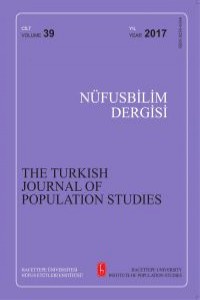DOES “NINE” MAKE ALL THE DIFFERENCE? Differences in first births between natives and Turkish migrants in Western Germany.
Öz
Fertility levels, including frequency of and age at first birth, differ considerably between Turkish migrants in Germany and the native German population. A central question in fertility research is which factors cause this difference to persist. This article examines whether one explanatory factor might be that young Turkish couples are more often able to count on the support of their own mothers when it comes to childcare, and that this greater support potential tends to encourage them towards family foundation. Data were used from the 1st wave of the German Generations and Gender Survey for the calculation of event history analysis models. The distance from home, the contact frequency and the quality of the relationship with the respondent’s own mother are used as indicators for the support potential. The results show that the requirements for care of grandchildren are indeed more favourable among the Turkish migrants. They live close to their mother’s home more often and have, on average, a better relationship quality. The findings also confirm Turkish migrants’ increased risk of a transition to a first child. Still, we do not find any indication that differences in support potential are explaining the different fertility behaviour of Germans and Turkish migrants in Germany.
Anahtar Kelimeler
fertility behaviour care of grandchildren Western Germany Turkish migrants event history analyses
Kaynakça
- Aassve, A., Meroni, E., Pronzato, C. (2012). Grandparenting and Childbearing in the Extended Family. European Journal of Population, 28(4), 499-518.
FARK NİNEDEN Mİ KAYNAKLANIYOR? İlk doğumlarda Batı Almanlar ve Türk göçmenler arasındaki doğurganlık farklılıkları
Öz
Anahtar Kelimeler
doğurganlık düzeyi torun bakımı Batı Almanya Türk göçmen olay geçmişi çözümlemesi
Kaynakça
- Aassve, A., Meroni, E., Pronzato, C. (2012). Grandparenting and Childbearing in the Extended Family. European Journal of Population, 28(4), 499-518.
Ayrıntılar
| Birincil Dil | İngilizce |
|---|---|
| Bölüm | Makaleler |
| Yazarlar | |
| Yayımlanma Tarihi | 22 Aralık 2017 |
| Gönderilme Tarihi | 20 Şubat 2017 |
| Yayımlandığı Sayı | Yıl 2017 Cilt: 39 Sayı: 1 |


